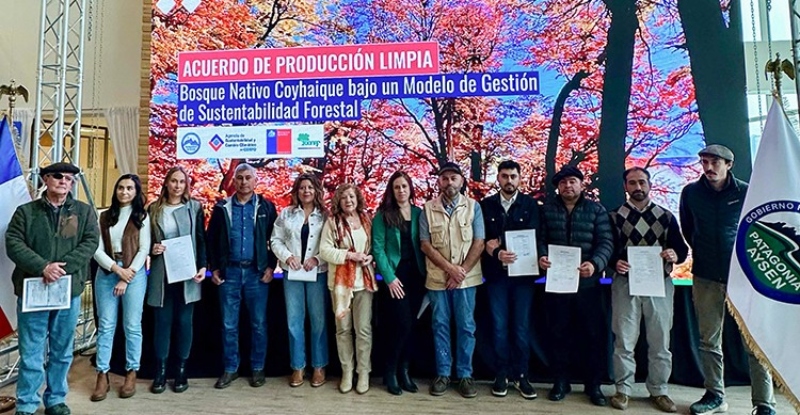To strengthen sustainable forest management on private properties with native forests and enhance the utilization and economic value of the goods and services provided by these ecosystems, the Agency for Sustainability andClimate Changeof Corfo (ASCC), together with authorities and a consortium of eight companies owningnative forest, signed the firstClean Production Agreement(APL) for the benefit of the native forest in Coyhaique.
The consortium—comprising the companies Ecobosque, El Richard 22, Comercial Bajo Hondo, Agroinnova, Heidi Wahl y Otro, Ensenada, Agrícola, Ganadera y Forestal Trahuilco, and El Rosado—will work over 24 months to implement Forest Management Plans under Forest Stewardship Criteria (PMCOF) on the participating properties, as established by Law 20.283 on the Recovery ofNative Forestand Forestry Promotion. For this purpose, they will receive support from the Ministries of Agriculture, Energy, and Environment, the Aysén Regional Government, CONAF, INDAP, and SERCOTEC.
The participating companies cover 1,617 hectares ofnative forest, and it is expected that other properties will join the APL implementation in the next two months, reaching a total of 3,000 hectares. This initiative contributes to the National Strategy onClimate Changeand Vegetation Resources, aligning with the goals set in Chile's Nationally Determined Contribution (NDC), where the country has committed to sustainably managing 200,000 hectares ofnative forest.
While congratulating the companies for signing the APL, Regional Governor Marcelo Santana stated, "The proper use of our natural resources will allow the region to open avenues for growth. This will not only address land management but also create certainty, clarity, and, above all, a vision for the continued development of timber and firewood production associated withnative forestwithout difficulties."
Capacity Building
Among the APL's actions are strengthening the capacities ofnative forestowners, sector professionals, and the community in competitiveness, sustainability, and adaptation toclimate change, as well as raising awareness about the value of native forests and the benefits of management plans.
To boost competitiveness, a public-private cooperation strategy will be developed to promote the consumption of forestry products. Additionally, the APL will encourage the application of the Solid Biofuels Law and facilitate access to financing for infrastructure and technology through programs like Comprehensive Biomass Centers or Dryer Firewood fornative forestowners.
Ximena Ruz, Executive Director of ASCC, stated, "Here we have a working agreement with CONAF, where our goal has been to support forest stewardship plans for sustainable forest management. Chile has an international commitment to achieve sustainable management of 200,000 hectares ofnative forest. In this regard, as an Agency, we are supporting and driving these initiatives. Our focus is productive development, and in this line, forest stewardship management plans promote other initiatives and greater competitiveness among producers. We want other products to be developed, forests to be preserved, and sustainable economic growth to thrive in this region."
The collaboration between CONAF and the Agency for Sustainability andClimate Changehas been key to promoting sustainable management ofnative forest, prioritizing Aysén for its forest wealth and environmental challenges. The APL "Native ForestCoyhaique under a Sustainable Forest Management Model" is directly linked to Forest Stewardship Management Plans (PMCOF), as it seeks to strengthen their implementation amongnative forestowners, ensuring sustainable management over a 10-year period and preventing degradation and deforestation of native resources.
Ronald Valenzuela, Regional Director of CONAF, noted, "Development can only be achieved through public-private partnerships for two simple reasons: on one hand, it allows us as an institution to fulfill our mission and commitment, which is to increase and improve forest quality while ensuring sustainable management. We are very satisfied with the preparation of this work, which was gradual, arduous, and highly professional, and in which we have primarily contributed through the provision of forest stewardship management plans."
Challenges of the Forest Ecosystem in Aysén
The forest ecosystem of the Aysén Region, which represents 24.6% of Chile'snative forest, faces challenges from wildfires, unsustainable agricultural practices, andclimate change. Practices such as firewood extraction with sustainable and industrialized approaches limit sector development and contribute to air pollution, especially in Coyhaique, where the use of wet firewood generates high levels of fine particulate matter (PM2.5).
For José Ignacio Aguilar, legal representative of Ecobosque, the consortium's lead company, "This public-private alliance helps us leverage resources and work more consciously. This forest stewardship plan benefits us because we plan for 20 to 30 years, giving us the assurance that we can operate. We believe in this project mainly to bring resources to the Coyhaique municipality, raise awareness about firewood, and mitigateclimate change, so we hope more companies will join."
Source:







Comentarios (0)
No hay comentarios aún. ¡Sé el primero en comentar!
Deja un comentario